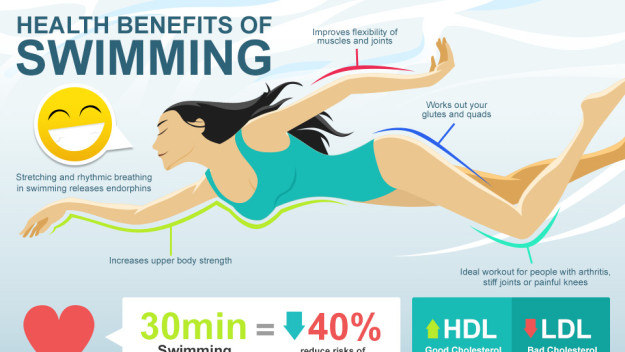You have probably heard dozens of times that swimming is good for your physical and mental health, but what are the actual effects of performing this activity regularly? This is the question we will try to answer in the following paragraph so that you truly understand how swimming benefits your body and mind.
Reduced risk of heart disease
Swimming has been the object of many researchers who wanted to see how this sport affects the risk for cardiovascular disease and whether it has an effect on longevity. Fortunately, the conclusion was that people who swim regularly live longer than those who are sedentary or who do no other physical activity than walking. Dr. Steven Blair supported by the University of South Carolina followed 40,000 men for 32 years to draw this conclusion.
Studies have also found that swimming reduces blood pressure while improving the way your heart pumps blood. This is coupled by a better lung function and an overall reduced risk for heart disease and stroke. Moreover, the fact that muscles are activated to use glucose as an energy source decreases blood sugar levels. This means that people who suffer from type II diabetes can lower their glycaemia partly through swimming.
We don’t suggest that it’s enough, in fact you have to be very careful about your carbs intake because vigorous workouts can lower your blood sugar levels too much. That’s why you have to always consult your doctor before starting a workout routine, be it swimming, running, or strength training. The doctor might have to monitor you closely and to adjust how much anti-diabetic medication must be administered per day.
Weight loss and muscle tone
Considering that swimming is an aerobic activity, it burns calories. The best thing is that all the major muscles are involved thus ensuring optimal full body toning. Improving muscle strength goes hand in hand with weight loss and so does HIIT. High intensity interval workouts can be done while swimming too, contrary to what some people think. For example, you could swim one lap as fast as you can, followed by a recovery lap and then repeat this as many times as possible. Remember to always do a warmup and a cooldown to prevent injuries.
No joint injuries
It is widely known that swimming is a low impact aerobic activity as opposed to running. This means that even those who suffer from degenerative joint disease are allowed and actually encouraged to swim regularly. Swimming is generally gentle on your ankles and knees so you can do it even when your joints are injured as long as you don’t force yourself.
Positive mood changes
According to the Center for Disease Control and Prevention, swimming has a positive impact on how you feel. People have noticed a decrease in anxiety levels and improvements in mental status in women who suffer from fibromyalgia. Those who suffer from this condition live in constant and sometimes pain that affects their day to day life, hence the depression. It is true that a release of endorphins can be achieved virtually through any type of physical activity, but swimming is less harsh on your body.
Conclusion
To sum up, you should swim to improve your health because:
Your mood will be better
You train your heart and lungs to be more efficient, thus living a longer and healthier life
You might gain additional control over your diabetes
You lose weight and strengthen virtually every muscle in your body
Injuries are quite rare and your joints are not subjected to strains

